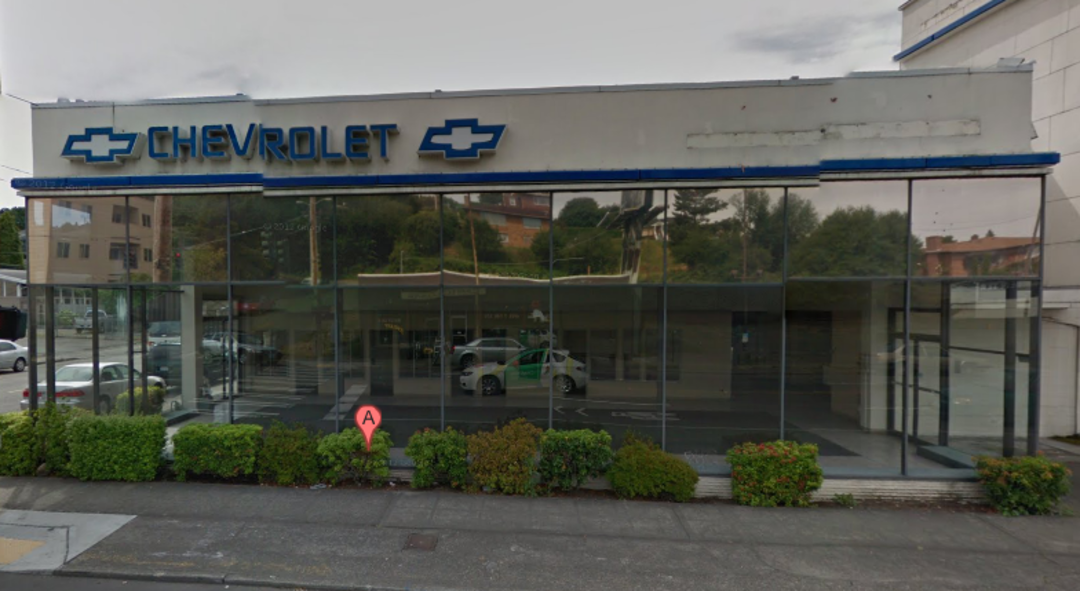Does Whole Foods Pay Too Little for Seattle? Depends Who You Ask.

The current site of a proposed Whole Foods in West Seattle. Mayor Mike McGinn has opposed the grocery store for what he calls its low wages and for being pedestrian-unfriendly.
The Whole Foods controversy just keeps getting richer.
For those who aren't up to speed: After Mayor Mike McGinn expressed his opposition to an alley vacation sought by Whole Foods in Seattle, on the grounds that Whole Foods doesn't pay its workers enough and isn't unionized, one of his opponents, Peter Steinbrueck, told PubliCola on Monday in our regular One Question column, that McGinn's position was "an abuse of the city's regulatory functions" and potentially "illegal."
"I think it’s perfectly legitimate for the mayor to speak out personally on his views on social goals and social justice, such as a living wage and housing affordability, but to use the land use code and other regulatory devices for social purposes is unfair," Steinbrueck told us Monday, "because it is applying an unequal approach. I just feel very strongly that the regulatory system does not exist as a tool to advance certain social goals."
So does Whole Foods pay too little for a progressive city like Seattle, and is that a sufficient reason to oppose a new Whole Foods store (which would be one of several in Seattle) in West Seattle?
We called city attorney Pete Holmes' office about Steinbrueck's position; Holmes' spokeswoman, Kimberly Mills, said she couldn't comment because the city attorney's office "doesn't opine on subjects except to the elected," meaning mayors or city council members.
McGinn argues that Whole Foods pays significantly less than other local private grocery employers and doesn't provide a health-care plan that's competitive with other groceries. Although Whole Foods claims its average non-managerial pay is $16.15 an hour, McGinn spokesman Robert Cruickshank says the company has stubbornly refused to release salary data, so there's no reason to believe them.
And Heather Weiner, a consultant for the group GettingItRight4WS.org, says Whole Foods is "a huge, national chain that has the national resources to drive down the compensation packages at local competitors like PCC and Met Market."
For what it's worth, Linda Mitchell, a consultant for Whole Foods project developer, Weingarten Realty, says the starting salary at the West Seattle Whole Foods will be $11 an hour, and that the pay scale for grocery clerks caps out at $29.50 an hour. She also noteds that Whole Foods has been named one of Fortune magazine's "100 Best Companies to Work for" for the past 16 years.
When we noted that the city itself pays many of its workers less than Whole Foods' claimed average wage of $16.15 an hour (30 job classifications at the city start at less than that hourly rate), Cruickshank responded that many of the jobs in those classifications were "part-time or student internships."
McGinn's office told PubliCola he plans to look at factors like living wages when considering whether to recommend an alley vacation for a huge mega-hotel proposed by developer Richard Hedreen in downtown Seattle; Hedreen has said he can't afford to pay the union wages demanded by Unite Here, the hotel workers' union. Hedreen has contributed to McGinn opponent Ed Murray; Unite Here has gone all in, to the tune of $50,000 so far, for a pro-McGinn independent expenditure campaign).
However, McGinn did not raise similar issues about the proposed vacation of Occidental St. for San Francisco hedge fund manager Chris Hansen's proposed arena in SoDo, or the vacation of three streets for Amazon's headquarters in South Lake Union.
Amazon is non-union. As for the arena, although the city did agree to sign a community benefit agreement saying they would consider factors that "may include economic development [and] employment opportunities with living wages," the agreement between the city and Hansen does not require union jobs (and cannot, by law.)
Contacted by phone, private land-use attorney Peter Goldman—a Steinbrueck supporter who has opposed McGinn's push for a new arena in SoDo—said McGinn "has clearly overreached" his authority at the same time that Unite Here, the hotel and food workers' PAC, has both endorsed the mayor's reelection bid and supported the arena. (We've also contacted land-use attorneys who've remained neutral in the race but have not yet heard back).
"The arbitrariness and the double standards of this—it's just gross," Goldman says. However, he disagrees with Steinbrueck (who is not an attorney) that the mayor's position is illegal. "For this guy to come in at the last minute and be opposed to this just comes out of nowhere," Goldman says, but "I don’t think it’s illegal. I think it's arbitrary"—meaning that picking Whole Foods for special approbrium isn't fair.
McGinn has also raised the issue of pedestrian access, arguing in his July 15 letter to SDOT that the proposed project fails to "develop a pedestrian environment that sustains healthy communuties and supports a vibrant economy" because it's "particularly large" and includes a large driveway for truck access.
As commenters on our previous posts (and other blogs like West Seattle Blog) have pointed out, the current land use on the proposed Whole Foods site—which would also add 370 apartments to the neighborhood—is hardly conducive to a "vibrant" pedestrian environment: It includes a gas station, two used-car lots , and a funeral home.
In a statement to PubliCola, Murray expressed his own opposition to McGinn's anti-Whole Foods position yesterday. Bruce Harrell, the other leading contender in the mayor's race, has not returned multiple calls for comment.




